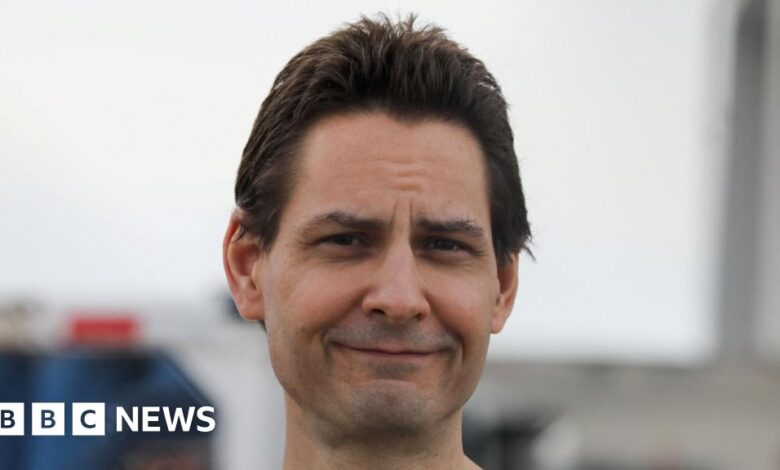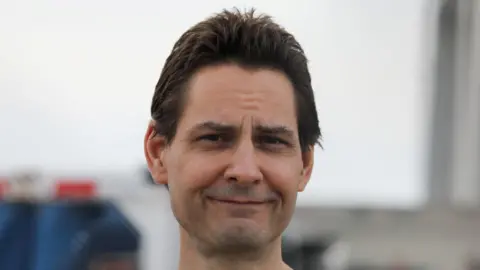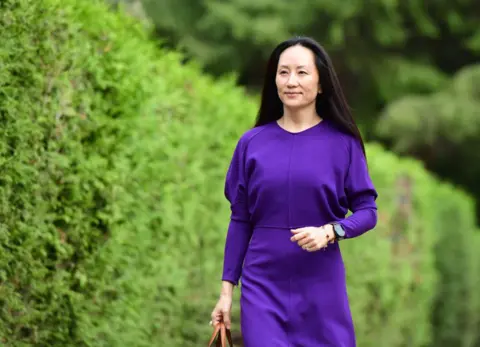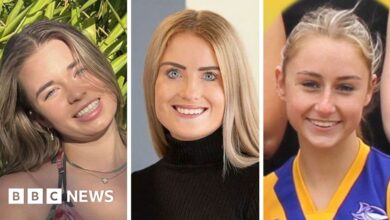Canadians allege ‘psychological torture’ in Chinese prison

 Reuters
ReutersA former Canadian envoy whose detention in China has sparked a high-profile diplomatic row has accused Chinese authorities of “psychological torture” against him.
Michael Kovrig said he was held incommunicado for months and subjected to “relentless interrogation” when he was arrested in December 2018 and held for more than 1,000 days.
The Chinese government has denied his allegations and said it has handled his case legally.
Mr Kovrig and Canadian citizen Michael Spavor were arrested on espionage charges following the arrest of Chinese businesswoman Meng Wanzhou in Vancouver, in a case Canada has called “hostage diplomacy”.
At the time, the Canadian government arrested Ms. Meng, the chief financial officer of Chinese tech giant Huawei, on fraud charges in the United States.
“Two Michaels” is was only released nearly two years later.after US prosecutors dropped their extradition request and agreed to release Ms. Meng.
“It was the most horrible and painful thing I’ve ever experienced,” Mr. Kovrig shared in an interview with Canadian public broadcaster CBC that aired Monday night.
Describing his pain for the first time, Mr. Kovrig said that on the night of his arrest, he was walking home from dinner in Beijing with his partner, who was six months pregnant at the time.
“We went up the spiral staircase right in front of the plaza in front of my apartment building, and boom,” he said.
“There were about a dozen men dressed in black with cameras surrounding us, shouting in Chinese: ‘It’s him.’”
Mr Kovrig, a former diplomat who was working as a senior adviser to the International Crisis Group think tank at the time, said he was then handcuffed, blindfolded and thrown into a black SUV.
After being taken away for nearly an hour, he was placed in a padded cell, where he would remain for months.
“They said, ‘You are suspected of endangering China’s national security. You will be questioned,’” Mr. Kovrig said. “A chill went down my spine.”
Mr. Kovrig accused the Chinese government of treating him in violation of international law.
“The UN standard is no more than 15 days in solitary confinement. Any more than that is considered psychological torture. I was there for almost six months,” he said.
He added that he was held in complete isolation under fluorescent lights for six months, and interrogated for six to nine hours a day.
He said he was often locked in a chair for hours at a time and sometimes had to survive on just three bowls of rice a day.
“They are trying to bully, torment, terrorize and force you to accept their skewed version of reality,” Mr Kovrig said.
After six months, Mr. Kovrig and Mr. Spavor, who were being held separately, were formally arrested.
Mr Kovrig was moved from a windowless cell to a pretrial detention facility, where he shares a cell with dozens of inmates.
“It felt like going from hell to nowhere,” he said, describing this time with daylight streaming through Plexiglass windows and enough space to move around.
Mr Kovrig remained there for the next two years, before being released in September 2021 — the same day the US dropped its extradition request for Meng Wanzhou.
Within two hours of Meng’s extradition request being dropped, he and Spavor traveled through Chinese airspace on a plane bound for Canada, according to CBC.
Responding to Mr. Kovrig’s interview, Lin Jian, a spokesman for the Chinese Foreign Ministry, said that Chinese judicial authorities had handled the case in accordance with the law.
“Lies and smears cannot change the fact that the person you mentioned committed a crime. We advise the relevant parties to respect the truth and reflect on their mistakes,” he told reporters in Beijing on Tuesday.
 Getty Images
Getty ImagesMr. Kovrig’s allegations about his treatment by Chinese authorities contrast with Ms. Meng’s experience in Canada.
The heir was released on bail and placed under house arrest, but was allowed to leave his home during the day and roam a large area of Vancouver under supervision.
She reportedly went on private shopping trips to high-end fashion stores, and received massages and painting lessons at her villa. Meng later wrote that she finally had time to “read a book from cover to cover” and “carefully complete an oil painting.”
Her liberation received prominent coverage and praise in China, where many people support her and her father, Huawei founder Ren Zhengfei.
But the case has severely strained China’s diplomatic relations with Canada and the United States, with Canadian Prime Minister Justin Trudeau accusing China of “using arbitrary detention as a tool to achieve political goals.”
China denies the allegations and has countered that Ms Meng’s arrest is an example of “political persecution of Chinese citizens aimed at suppressing Chinese high-tech enterprises”.





